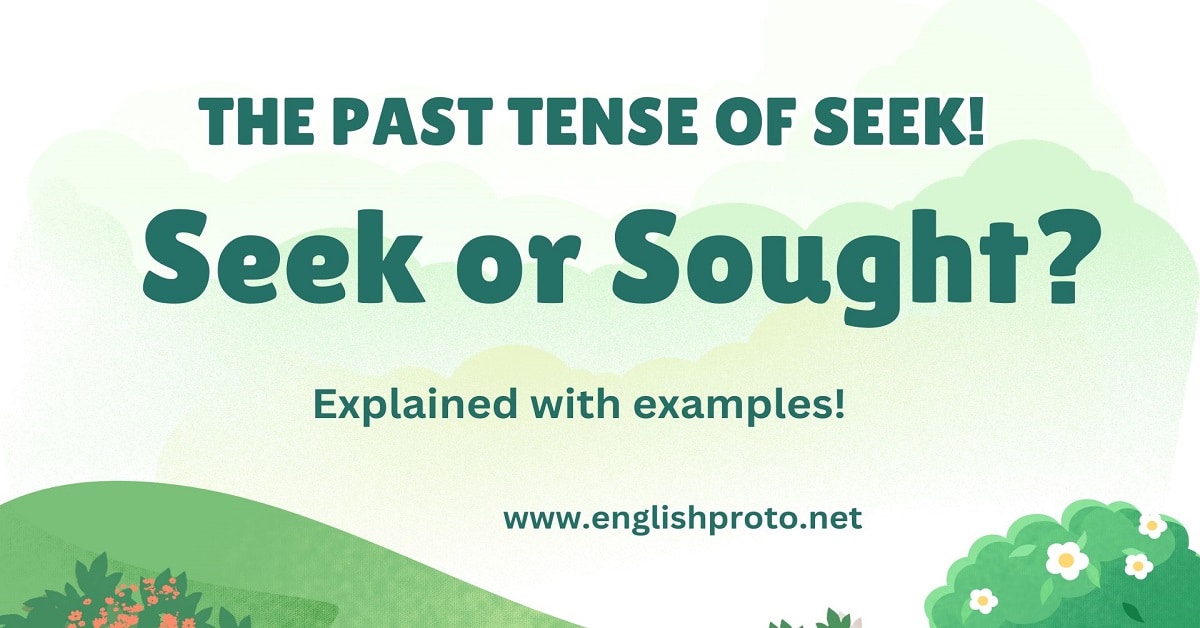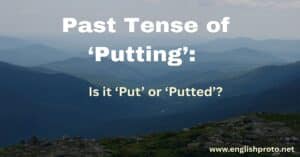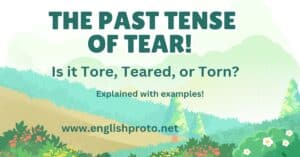The past tense of ‘seek’? Is it seek or sought? If you’ve ever paused mid-sentence wondering which is correct, you’re not alone! Understanding this simple yet tricky grammar rule can make your writing shine and your conversations flow effortlessly.
You’re here because you want clarity, and that’s exactly what this article delivers. We’ll unravel the confusion, explain why the past tense isn’t “seeked,” and arm you with practical examples to use confidently.
So, if you’re ready to take your language skills up a notch, keep reading, because getting this right is easier than you think!
Quick Summary
The correct past tense of seek is sought. The word sought represents an action that has already taken place, where someone actively looked for or tried to obtain something. For example:
- Present: I seek advice on this matter.
- Past: I sought advice on this matter yesterday.
Key Takeaways:
- Seek is the present tense.
- Sought is the past tense.
- The two forms cannot be used interchangeably.
Reasons for Confusion
Many English learners, and even native speakers, sometimes get confused between seek and sought for several reasons:
- Irregular Verb: Unlike regular verbs that simply add “-ed” for the past tense (e.g., walk → walked), seek changes to sought, making it irregular.
- Similarity to Other Words: Words like see and seen or think and thought might create confusion due to their phonetic or structural resemblance.
- Regional Variations: In some informal speech or dialects, people mistakenly use seeked, further complicating understanding.
Detailed Explanation
What Does “Seek” Mean?
To seek means to actively look for, search, or attempt to find something. It is often used in formal contexts or when describing deliberate efforts.
Correct Usage of Sought
Sought is the past tense and past participle of seek. It indicates that the action of seeking occurred in the past. Using sought correctly improves clarity and demonstrates a strong command of English.
Examples of Usage:
- She sought help from a professional counselor.
- We sought shelter during the storm.
- The explorers sought treasure in the uncharted lands.
Why Is It Not “Seeked”?
In English, many verbs are irregular, meaning they do not follow the usual pattern of adding “-ed” to form the past tense. Instead of seeked, the language evolved to use sought as the past form.
Common Errors
- Using “Seek” as the Past Tense:
- Incorrect: Yesterday, I seek advice from my mentor.
- Correct: Yesterday, I sought advice from my mentor.
- Using “Seeked” Instead of “Sought”:
- Incorrect: The lawyer seeked justice for their client.
- Correct: The lawyer sought justice for their client.
- Overusing “Seek” in Informal Contexts:
- Incorrect: He seeks for his keys every morning.
- Correct: He looks for his keys every morning.
Synonyms or Alternatives
When seek or sought doesn’t fit your tone or context, consider these synonyms:
| Synonym | Meaning | Example Sentence |
|---|---|---|
| Search | To look for something actively | I searched for my glasses everywhere. |
| Look for | To try to find something | They’re looking for a new apartment. |
| Pursue | To strive to achieve or obtain | She pursued her dream of becoming a doctor. |
| Explore | To investigate or examine thoroughly | They explored every possibility. |
These alternatives can be useful in casual or specific contexts where seek feels too formal.
Examples in Sentences
Proper usage of seek and sought can be mastered with consistent practice. Below are various examples:
- Students seek knowledge through rigorous study.
- In ancient times, people sought answers from the stars.
- The detectives sought clues to solve the mystery.
- If you seek success, you must work hard.
- Yesterday, we sought advice from the board of directors.
Origins and History
The word seek has its roots in Old English, derived from sēcan, which means “to go in search of.” Over time, its past tense evolved into sought, stemming from the Middle English form sohte. This transformation mirrors the irregular nature of many verbs in English, reflecting linguistic influences from Germanic and other language families.
Conclusion
Understanding the distinction between seek and sought is essential for accurate communication. While seek is the present tense, sought is the correct past tense form. Misusing these words can lead to misunderstandings or appear unpolished in writing.
⚡ Quick Tip: When in doubt, remember: if you’re talking about the past, always choose sought!
By mastering this simple rule and practicing with examples, you’ll boost your confidence in writing and speaking English. So, the next time you’re “seeking” clarity, you won’t have to second-guess yourself.



